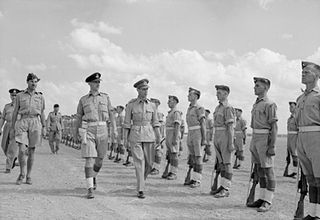This page is based on this
Wikipedia article Text is available under the
CC BY-SA 4.0 license; additional terms may apply.
Images, videos and audio are available under their respective licenses.

Air chief marshal is a four-star air officer rank which originated in and continues to be used by the Royal Air Force, where it is the most senior peacetime air force rank. The rank is also used by the air forces of many countries that have historical British influence and it is sometimes used as the English translation of an equivalent rank in countries which have a non-British air force-specific rank structure.

Marshal of the Royal Air Force Sir Andrew Henry Humphrey, was a senior officer in the Royal Air Force. He fought in the Second World War as a fighter pilot taking part in the Battle of Britain and also took part in the withdrawal from Aden in November 1967. He served as the Chief of the Air Staff advising the new Labour Government on the implementation of their latest Defence Review. He then served as Chief of the Defence Staff but caught pneumonia within three months of taking office and died shortly afterwards.

Staff College, Camberley, Surrey, was a staff college for the British Army and the presidency armies of British India. It had its origins in the Royal Military College, High Wycombe founded in 1799, which in 1802 became the Senior Department of the new Royal Military College. In 1858 the name of the Senior Department was changed to "Staff College", and in 1870 this was separated from the Royal Military College. Apart from periods of closure during major wars, the Staff College continued to operate until 1997, when it was merged into the new Joint Services Command and Staff College. The equivalent in the Royal Navy was the Royal Naval Staff College, Greenwich and the equivalent in the Royal Air Force was the RAF Staff College, Bracknell.

Marshal of the Royal Air Force Sir Dermot Alexander Boyle, was a senior officer in the Royal Air Force. He served in the Second World War initially as a staff officer with the Advanced Air Striking Force in Reims in which capacity he organised the evacuation of the Force through Brest in May 1940. His war service included tours as a bomber squadron commander, as a station commander and also as an air group commander. He was Chief of the Air Staff in the late 1950s and, in that role, deployed British air power during the Suez Crisis in October 1956 and defended the RAF against the views of Duncan Sandys, the Minister for Defence, who believed that the V bomber force rendered manned fighter aircraft redundant.

Marshal of the Royal Air Force Sir Denis Frank Spotswood, was a senior commander in the Royal Air Force. He fought in the Second World War as a flying boat pilot and then as a coastal reconnaissance squadron commander during Operation Torch, the invasion of North Africa. He served as a station commander in the late 1940s and early 1950s before becoming a senior air commander in the late 1950s. As the Chief of the Air Staff in the early 1970s he had a major role in implementing the defence savings demanded by the Heath Government in the face of economic difficulties at the time.
Air Chief Marshal Sir Denis Graham Smallwood, was a senior Royal Air Force commander.

Air Chief Marshal Sir Alfred Guy Roland Garrod, was a senior British Royal Air Force officer.

Air Marshal Subroto Mukerjee, OBE was the first Chief of the Air Staff of the Indian Air Force (IAF). Born in a Bengali family of repute, he was educated in India as well as England. He joined the Royal Air Force and later was one of the first recruits of the Indian Air Force. He had an illustrious career and had been awarded with many honours until his accidental death in 1960. He has been called the "Father of the Indian Air Force".

No. 22 Group is one of five groups currently active in the Royal Air Force, falling under the responsibility of Deputy Commander-in-Chief (Personnel) in Air Command. Its previous title up until 2018 was No. 22 (Training) Group. It is responsible for RAF training policy and controlling the Royal Air Force College and the RAF's training stations. As such, it is the direct successor to Training Group.
Air Marshal Sir Hugh Sidney Porter Walmsley, was a senior commander in the Royal Air Force during and after the Second World War. He was the final commander of the unified Royal Indian Air Force before its division upon India's independence and partition.

Air Vice Marshal Sir Laurence Frank Sinclair, was a Royal Air Force officer who was awarded the George Cross for rescuing a severely injured airman from a crashed and burning plane.
Air Chief Marshal Sir Edmund Cuthbert "Teddy" Hudleston, was a senior commander in the Royal Air Force.
Air Commodore Cathcart Michael Wight-Boycott CBE DSO and bar MA, RAF R’td was a British fighter pilot during the Second World War and a senior Royal Air Force officer during the post-war years. As an air commodore in 1961, Wight-Boycott became the 10th Commandant Royal Observer Corps.

Air Chief Marshal Sir Charles Edward Hastings Medhurst, was a First World War Royal Flying Corps pilot on the Western Front and later a senior officer in the Royal Air Force.

Air Chief Marshal Sir George Augustus Walker, was a Second World War bomber pilot, a jet aircraft pioneer, and a senior Royal Air Force officer in the post-war era, as well as a rugby player.
Air Chief Marshal Sir Alasdair McKay Sinclair Steedman, was a senior commander in the Royal Air Force.

Air Chief Marshal Sir Arthur Penrose Martyn Sanders, was a Royal Flying Corps pilot during the First World War and a senior Royal Air Force commander during the Second World War and the immediate post-war years.













